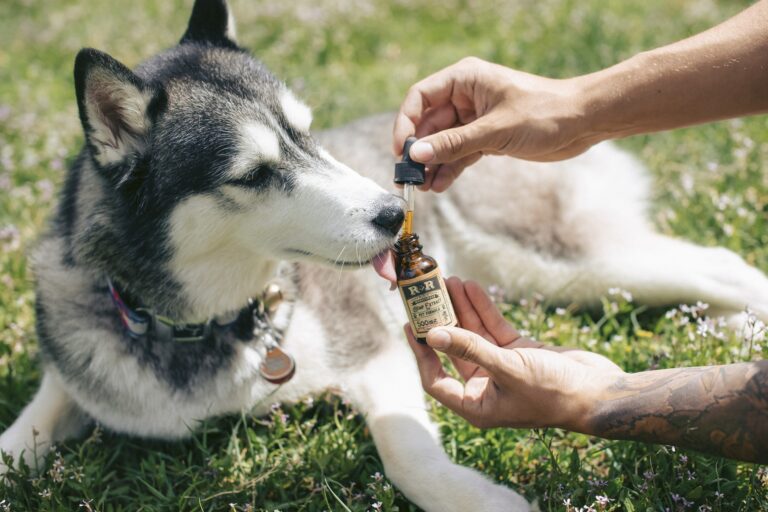CBD vs. Traditional Medications for Dogs: A Comprehensive Guide
Introduction
In recent years, the popularity of CBD (cannabidiol) as an alternative treatment for various health issues in dogs has surged. Pet owners are increasingly considering CBD as a potential remedy for conditions like anxiety, pain, and inflammation. However, it’s crucial to weigh the pros and cons of CBD against traditional medications to make an informed decision for your furry friend’s well-being.
The Rise of CBD in Pet Healthcare

CBD, derived from the hemp plant, is a non-psychoactive compound known for its potential therapeutic benefits. It interacts with the endocannabinoid system, which plays a vital role in regulating various bodily functions. This has led to a surge in interest from pet owners seeking natural alternatives to traditional medications.
Traditional Medications: Pros and Cons
Pros:
- Proven Track Record: Traditional medications have been extensively researched and tested for efficacy in treating specific conditions.
- Precision in Dosage: With precise dosing instructions, it’s easier to control the amount of medication your dog receives.
- Vet Supervision: Your veterinarian can closely monitor your dog’s progress, adjust dosages, and recommend alternative treatments if necessary.
Cons:
- Potential Side Effects: Traditional medications may come with a range of side effects, from mild to severe, depending on the drug and the individual dog’s sensitivity.
- Long-term Use Risks: Prolonged use of certain medications may lead to organ damage or other adverse effects over time.
- Limited Options for Some Conditions: In some cases, traditional medications may not provide a suitable solution for certain conditions or may not be well-tolerated by some dogs.
CBD for Dogs: Benefits and Considerations
Benefits:
- Natural and Non-Psychoactive: CBD is a natural compound derived from plants and does not produce the “high” associated with THC, another cannabinoid found in marijuana.
- Anxiolytic Properties: CBD may help alleviate anxiety and stress-related behaviors in dogs without causing drowsiness or sedation.
- Pain Management: CBD has shown promise in managing chronic pain and inflammation, making it an appealing option for dogs with arthritis or joint issues.
- Minimal Side Effects: When administered in appropriate dosages, CBD is generally well-tolerated with minimal side effects.
Considerations:
- Quality Matters: Ensure you source high-quality CBD products from reputable manufacturers to guarantee safety and effectiveness.
- Dosage Precision: Determining the right dosage for your dog may require some trial and error, and it’s crucial to start with low doses and gradually increase as needed.
- Consult Your Vet: Always consult your veterinarian before introducing CBD to your dog’s regimen, especially if your dog is already on other medications.
Making an Informed Decision

When deciding between CBD and traditional medications for your dog, consider the following steps:
1. Consult Your Veterinarian
Your veterinarian is your most reliable source of advice. They can assess your dog’s specific condition, medical history, and potential interactions with existing medications.
2. Research and Choose Reputable Brands
If you opt for CBD, choose products from established and reputable companies. Look for products with third-party lab testing to ensure purity and potency.
3. Start with Low Doses
Regardless of the treatment you choose, always start with low doses and monitor your dog for any adverse reactions or changes in behavior.
4. Monitor Progress
Regularly track your dog’s progress, noting any improvements or setbacks. Communicate with your vet about any concerns or adjustments that may be needed.
5. Be Patient and Flexible
Every dog is unique, and what works for one may not work for another. Be patient, and be willing to adjust the treatment plan as necessary.
Navigating Potential Challenges
As you embark on the journey of choosing the right treatment for your dog, there are a few challenges that you may encounter, regardless of whether you opt for CBD or traditional medications.
1. Regulatory Considerations
The regulatory landscape surrounding CBD for pets is still evolving. It’s important to stay informed about local laws and regulations regarding the use of CBD in your region. This will ensure that you’re in compliance with any legal requirements.
2. Trial and Error
Finding the optimal dosage and treatment plan for your dog can sometimes involve a degree of trial and error. This is true for both traditional medications and CBD. Be patient, and closely monitor your dog’s response to the chosen treatment.
3. Cost Considerations
Cost can also be a factor in your decision-making process. Traditional medications are typically well-researched and widely available, which may translate to lower costs. On the other hand, high-quality CBD products can be an investment. However, the potential benefits to your dog’s health and well-being may outweigh the initial expense.
4. Potential Interactions

If your dog is already on prescribed medications, it’s crucial to consider potential interactions with any new treatment, be it CBD or a traditional medication. Your veterinarian will play a crucial role in helping you navigate these potential interactions and make adjustments to your dog’s treatment plan as needed.
The Hybrid Approach: Integrating CBD with Traditional Medications
In some cases, a combination of CBD and traditional medications may offer the most comprehensive approach to your dog’s health. This hybrid approach can harness the benefits of both treatments, potentially maximizing the therapeutic effects while minimizing any potential drawbacks.
For example, if your dog is receiving traditional medication for a chronic condition, such as arthritis, integrating CBD may provide additional relief from pain and inflammation. Your veterinarian can guide you in creating a customized treatment plan that optimally addresses your dog’s specific needs.
Final Thoughts
Ultimately, the choice between CBD and traditional medications for your dog requires careful consideration, research, and consultation with your veterinarian. Both options have their merits and potential drawbacks, and what works best for one dog may differ for another.
Keep in mind that your dog’s health and well-being should always be the top priority. Regular check-ins with your veterinarian, open communication about your dog’s progress, and a willingness to adapt the treatment plan as needed are all crucial components of providing the best possible care for your furry friend.
By taking a thoughtful and informed approach, you can make a decision that not only addresses your dog’s specific health concerns but also contributes to their overall quality of life. Whether you choose traditional medications, CBD, or a combination of both, your dedication to your dog’s well-being is a testament to the love and care you have for your loyal companion.







